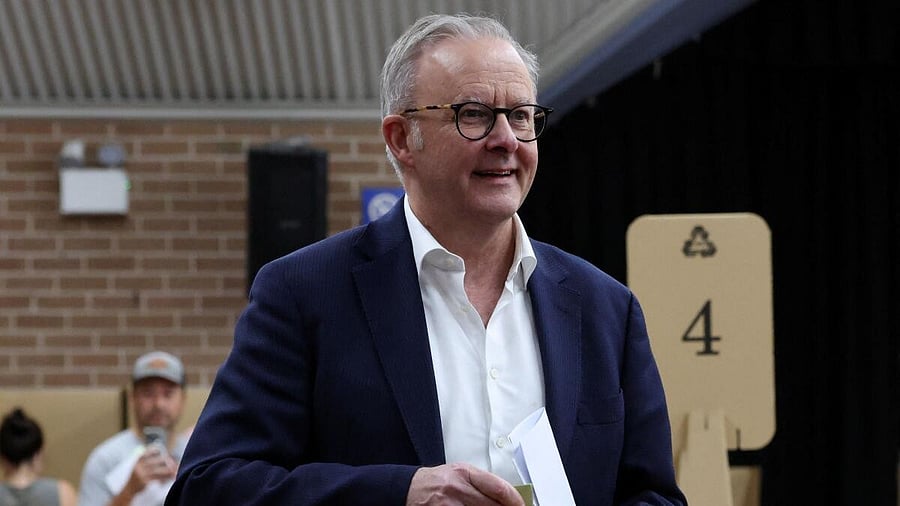
Australian Prime Minister Anthony Albanese.
Credit: Reuters Photo
Prime Minister Anthony Albanese of Australia has won a second term, completing a stunning turnaround for his governing center-left Labor Party that trailed in the polls for months as a festering cost-of-living crisis weighed on voters.
The Australian Broadcasting Corp., the country’s public broadcaster, called the election for Albanese just a half-hour after the last polls closed Saturday.
It was a resounding defeat of the conservative opposition led by Peter Dutton. He began the campaign riding dissatisfaction with the status quo but was hamstrung by a string of missteps and an association with some of President Donald Trump’s messaging and policies.
Dutton, the leader of the Liberal Party, also lost his parliamentary seat in the conservative stronghold of Queensland, which he had held since 2001. His loss echoed the ouster of Canada’s conservative leader, Pierre Poilievre, whose defeat was seen as a rejection of his embrace of Trump.
Australia was the third major US ally, after Germany and Canada, to hold elections since Trump’s second term began in January. The Trump administration’s efforts to influence the vote in Germany did not appear to bear fruit. In Canada, Mark Carney won on an anti-Trump platform. While Trump did not figure as prominently in Australia’s election, the global turmoil unleashed by his administration has weighed on voters there.
Neither camp mentioned Trump by name Saturday night, but the nods to his influence were clear. In his victory speech, an emotional Albanese said Australians had chosen “to face global challenges the Australian way.”
“We do not need to beg, or borrow, or copy from anywhere else,” he said. “We do not seek our inspiration overseas.”
For many younger voters, Albanese’s reelection was not an approval of his first term but a reluctant choice between two parties without bold ideas to fix the country’s problems, said Intifar Chowdhury, a lecturer in government at Flinders University in Adelaide.
In giving Albanese a second term, she said, “you are choosing the known evil over the unknown evil.”
With more than half the votes counted, the ABC projected that the Labor Party would widen its parliamentary majority in the 150-seat House of Representatives to at least 86 seats, from 78.
Voters casting their ballots Saturday said they were struggling to make ends meet.
“Everything costs so much,” said Judy Pula, a registered nurse and mother of two who was voting in the Sydney suburb of Liverpool during a break in her shift. Pula, 29, said she had voted for Labor in the past but this time opted for the Australian Greens. “I feel like a new leader would be beneficial for us.”
Cognizant of citizens’ pocketbook concerns, Dutton went to more than a dozen gas stations on the campaign trail, pitching his party’s proposal to cut a tax to reduce the price at the pump. Albanese repeatedly flashed his card for Medicare, Australia’s universal health care system, highlighting a promise to lower out-of-pocket costs.
Yet both parties mostly put forth largely incremental, short-term relief proposals rather than ambitious changes to address the fundamental roots of the current doldrums. The candidates also largely steered clear of what many agree is the most challenging global environment for Australia in a generation: its heavy reliance on the United States for defense and its economic dependence on trade with China, which has become less tenable as the rivalry between the two superpowers flares up.
“Mate, I’m not confident in either of them,” said Deb Young, 54, who had gone to the polls near Brisbane in Dutton’s home state of Queensland with her 11-year-old granddaughter. “They just keep addressing the same thing — cost of living. Move on. Why don’t they address the other issues out there?”
Young, a mental health nurse, still cast her vote for Dutton’s center-right Liberal Party, because she wanted Labor out of power.
Saturday’s victory for Albanese was a hard-fought recovery from the political low point of his first term: the failure of a 2023 referendum to enshrine the rights of representation for Aboriginal Australians in parliament. It had been a major campaign pledge of his when he was elected the previous year.
Dutton, a former police officer, opposed the measure and continued to take a stance against other symbolic recognitions of Indigenous people, saying they were “overdone.”
Early in the campaign, Dutton had adopted some buzzwords and policies that echoed Trump, including denouncing what he characterized as “wokeness” and diversity initiatives. That strategy seemed aimed at riding the worldwide rightward, anti-incumbent currents that dominated last year. But as the first months of the Trump presidency have played out, the association began to hurt Dutton.
Grahame Don, 56, voted for the Liberal Party for decades but started backing Labor in the last election. Trump’s tone of talking about issues was bleeding into Australian politics, he said Saturday.
“This country has only gained from things like migration and international students that they have tried to make divisive,” he said.